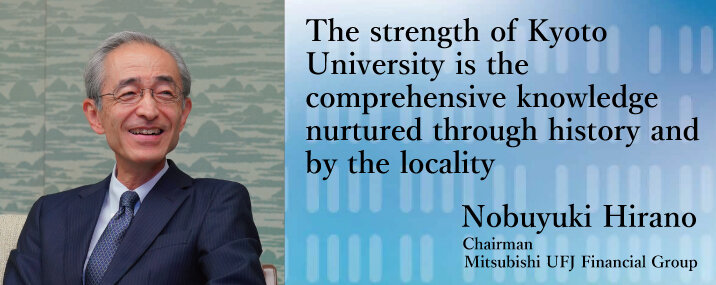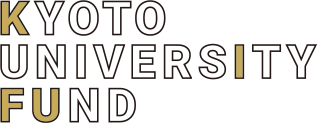Vol.19 Interview with Donors

Nobuyuki Hirano
Born in 1951 in Gifu Prefecture. Graduated from the Faculty of Law, Kyoto University, in 1974. Joined Mitsubishi Bank in the same year. After working overseas in the U.S. and Europe, became the president of MUFG Bank in 2012 and the president of the Mitsubishi UFJ Financial Group in 2013. In current position since 2019.
A vice chairman of the Japan Business Federation, the chairman of the Japan-U.S. Business Council, and the chairman of the Mitsubishi Memorial Foundation for Educational Excellence.

Q How was your student life at Kyoto University?
Kyoto is the birthplace of my mother and a place I visited often with my friends. It has 1,200 years worth of culture and is home to Kyoto University, a stronghold of knowledge. My yearning towards the place and knowledge drove me to aim for Kyoto University from an early age.
In 1970, I enrolled in the midst of student movements, and I rarely attended classes during my freshman year. Instead, I enjoyed extracurricular activities, such as visiting temples and shrines and watching nouvelle vague films and Juro Kara's situation theater in the Seibu-Kodo Hall.
As a sophomore, I joined a preliminary seminar by Professor of Sociology Keiichi Sakuta. I had read A Reconsideration of the Culture of Shame when I was in high school, so I was thrilled to be instructed by Keiichi Sakuta in the flesh.
Upon declaring my major from the junior year, I joined the Ryohei Hayashi seminar of the Civil Code while also participating in extracurricular exercise classes held by Kichitaro Katsuda, professor of anarchism research, and Professor of International Politics Masataka Kosaka. The phrase "freedom and equality contradict each other" uttered by Professor Katsuda and the straight question "Is being strong a good thing?" posed by Professor Kosaka were shocking to me. It was a rich and privileged four years of learning from specialized seminars and surrounding communities.
Q What did you like about learning at Kyoto University?
I actually wanted to study aesthetics, but this worried my mother, so I ended up going to the Faculty of Law (lol). I hear that it's not as popular as before, but the law forms the foundation of society. My biggest takeaway is that I learned about the Rule of Law, which has become a hot topic as the U.S.-China conflict escalates, and acquired the ability to maintain a multifaceted perspective through practical thinking patterns used in the study of law.
For example, the concept of balancing of interests refers to comparing conflicting interests for a reasonable interpretation of the law. The law does not provide a deductive conclusion, and choices must be made so that matters can be judged relatively. The real world is full of situations in which choices must be made, such as whether to protect privacy or prioritize the public interest in taking measures against COVID-19, and in such circumstances a multifaceted perspective is indispensable.
On the other hand, I do have regrets. I recall seeing Dr. Hideki Yukawa walking on the stone steps of Kurodani-san (Konkai-Komyo-ji Temple) and bowing to him on the spur of the moment. Natural science built by Nobel laureates was within reach, and Kitaro Nishida and other scholars of Kyoto University lineage were flourishing. Worlds of knowledge representing Kyoto University were at my fingertips, and my surrounding was laced with veins of knowledge, and I never bothered to access them.
Q What is the value of Kyoto University as seen by
the business community?
In my view, the essence of Kyoto University is "critical thinking that breaks through barriers of existing matters and common sense, and respect for comprehensive knowledge." This is probably the result of a successful fusion of the culture accumulated in this ancient capital and modern knowledge established by the sound criticism spirit nurtured and developed by Kyoto University. Indeed, the value of Kyoto University is its accumulation of deep and wide-ranging knowledge.
When I had the chance to speak with Chairman Nakanishi of Hitachi, Ltd., he said of the Hitachi Kyoto University Laboratory, "We also conduct joint research with the University of Tokyo, but with Kyoto University, we work on deeper themes, such as 'issues that arise from being human.'" This simply depicts the image of Kyoto University as seen from the business perspective. To tackle unanswered problems associated with mankind and its development, such as taking countermeasures against COVID-19 or balancing economic development with social disparities and global warming issues while achieving SDGs, the only way is through comprehensive power of knowledge.
Q How do you view the challenges of Kyoto University from
the perspective of the business community?
Producing the largest number of Nobel laureates among Asian universities is its past strength, and whether it can continue to do so for the next 10 or 20 years is a future challenge. I think this is deeply related to how it responds to the globalization trend.
Globalization is also multifaceted. First is that, although some may disagree, Japanese universities are falling far behind other Asian universities in the Financial Times' global ranking of higher education. This phenomenon probably has the same root as the fact that Japan's position in the business world is being taken over by China and emerging nations. What do we do about this?
Another is the development of global human resources. Some managers advocate English education, IT education, etc., but truly global human resources are those who are equipped with comprehensive strength backed by educated knowledge that can tackle global issues. By educated knowledge here, I mean deep and broad knowledge and skills (art) based on liberal arts, which originated in the Greek and Roman times.
In that respect, Kyoto University has an abundance of veins of culture and knowledge formed throughout its long history, as already mentioned. Faculty barriers should be removed so that these veins can be organically combined to offer more interactive classes, and diversity and mobility should be enhanced for both people and research. I hope to see such efforts taking place in the 125th anniversary project.
Q On the 125th anniversary of its founding, please tell us your hopes for
Kyoto University and send a message to Kyoto University students.
Kyoto is a land that has produced a great number of entrepreneurs brimming with venture spirit. This makes it easy to organize industry-academia collaborations. The city itself is very charming and attracts international students. The advantage of being located in Kyoto must be utilized as a competitive weapon. In the WINDOW concept proposed by the former President Juichi Yamagiwa, there are seemingly contradictory words such as WILD and NOBLE, but the fact that all of such words and ideas somehow coexist is the mystery and the charm of Kyoto University. I would like to see this character trait successfully connected to the place that is Kyoto in order to increase the global presence of Kyoto University.
And to Kyoto University students, I would like you to acquire the strength to survive the age of VUCA※, which is full of uncertainties and volatile changes; use your brain to think deeply and hard so that you may tackle unanswered questions; and expand your interpersonal network to transcend fields and communities. A turbulent era is an opportunity for the younger generation to create a new era. Please accumulate strength in preparation for the impending moment when you will spread your wings and fly.
※ VUCA is a coined word that is an acronym of Volatility, Uncertainty, Complexity, and Ambiguity.
(Interviewed in September 2020)

